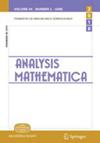关于正矩阵半群的莱维定理的一般化
IF 0.5
3区 数学
Q3 MATHEMATICS
引用次数: 0
摘要
我们概括了正矩阵半群的一个基本定理,即每个分量要么在所有时间都严格为正,要么同等于零("莱维定理")。我们对这一事实的证明并不要求矩阵在时间为零时是连续的。我们还用序列空间上的正算子半群术语对这一定理进行了表述。本文章由计算机程序翻译,如有差异,请以英文原文为准。
A generalization of Lévy’s theorem on positive matrix semigroups
We generalize a fundamental theorem on positive matrix semigroups stating that each component is either strictly positive for all times or identically zero (“Lévy’s Theorem”). Our proof of this fact that does not require the matrices to be continuous at time zero. We also provide a formulation of this theorem in the terminology of positive operator semigroups on sequence spaces.
求助全文
通过发布文献求助,成功后即可免费获取论文全文。
去求助
来源期刊

Analysis Mathematica
MATHEMATICS-
CiteScore
1.00
自引率
14.30%
发文量
54
审稿时长
>12 weeks
期刊介绍:
Traditionally the emphasis of Analysis Mathematica is classical analysis, including real functions (MSC 2010: 26xx), measure and integration (28xx), functions of a complex variable (30xx), special functions (33xx), sequences, series, summability (40xx), approximations and expansions (41xx).
The scope also includes potential theory (31xx), several complex variables and analytic spaces (32xx), harmonic analysis on Euclidean spaces (42xx), abstract harmonic analysis (43xx).
The journal willingly considers papers in difference and functional equations (39xx), functional analysis (46xx), operator theory (47xx), analysis on topological groups and metric spaces, matrix analysis, discrete versions of topics in analysis, convex and geometric analysis and the interplay between geometry and analysis.
 求助内容:
求助内容: 应助结果提醒方式:
应助结果提醒方式:


